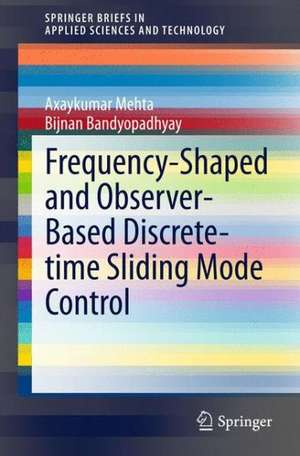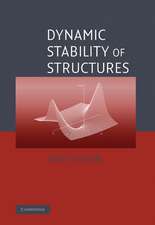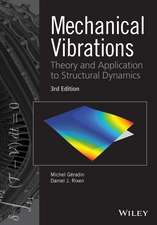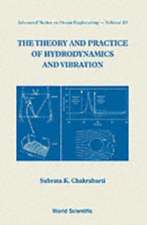Frequency-Shaped and Observer-Based Discrete-time Sliding Mode Control: SpringerBriefs in Applied Sciences and Technology
Autor Axaykumar Mehta, Bijnan Bandyopadhyayen Limba Engleză Paperback – 21 ian 2015
Din seria SpringerBriefs in Applied Sciences and Technology
-
 Preț: 380.29 lei
Preț: 380.29 lei - 17%
 Preț: 360.33 lei
Preț: 360.33 lei - 20%
 Preț: 386.11 lei
Preț: 386.11 lei -
 Preț: 380.07 lei
Preț: 380.07 lei -
 Preț: 377.95 lei
Preț: 377.95 lei -
 Preț: 382.32 lei
Preț: 382.32 lei -
 Preț: 376.59 lei
Preț: 376.59 lei -
 Preț: 379.09 lei
Preț: 379.09 lei -
 Preț: 378.12 lei
Preț: 378.12 lei - 20%
 Preț: 293.83 lei
Preț: 293.83 lei -
 Preț: 344.90 lei
Preț: 344.90 lei -
 Preț: 321.35 lei
Preț: 321.35 lei -
 Preț: 264.79 lei
Preț: 264.79 lei -
 Preț: 344.90 lei
Preț: 344.90 lei -
 Preț: 356.45 lei
Preț: 356.45 lei -
 Preț: 382.95 lei
Preț: 382.95 lei -
 Preț: 355.65 lei
Preț: 355.65 lei -
 Preț: 479.67 lei
Preț: 479.67 lei -
 Preț: 415.18 lei
Preț: 415.18 lei -
 Preț: 444.52 lei
Preț: 444.52 lei - 20%
 Preț: 301.85 lei
Preț: 301.85 lei -
 Preț: 409.43 lei
Preț: 409.43 lei - 20%
 Preț: 322.17 lei
Preț: 322.17 lei -
 Preț: 355.48 lei
Preț: 355.48 lei - 15%
 Preț: 462.51 lei
Preț: 462.51 lei -
 Preț: 377.18 lei
Preț: 377.18 lei -
 Preț: 355.92 lei
Preț: 355.92 lei -
 Preț: 382.95 lei
Preț: 382.95 lei -
 Preț: 378.12 lei
Preț: 378.12 lei -
 Preț: 378.12 lei
Preț: 378.12 lei -
 Preț: 380.07 lei
Preț: 380.07 lei -
 Preț: 380.07 lei
Preț: 380.07 lei - 20%
 Preț: 326.28 lei
Preț: 326.28 lei -
 Preț: 312.68 lei
Preț: 312.68 lei -
 Preț: 356.42 lei
Preț: 356.42 lei -
 Preț: 412.30 lei
Preț: 412.30 lei - 20%
 Preț: 225.31 lei
Preț: 225.31 lei -
 Preț: 378.12 lei
Preț: 378.12 lei -
 Preț: 376.59 lei
Preț: 376.59 lei -
 Preț: 195.87 lei
Preț: 195.87 lei -
 Preț: 376.22 lei
Preț: 376.22 lei - 20%
 Preț: 324.64 lei
Preț: 324.64 lei - 20%
 Preț: 288.73 lei
Preț: 288.73 lei -
 Preț: 377.57 lei
Preț: 377.57 lei -
 Preț: 261.91 lei
Preț: 261.91 lei -
 Preț: 381.98 lei
Preț: 381.98 lei -
 Preț: 273.63 lei
Preț: 273.63 lei -
 Preț: 410.85 lei
Preț: 410.85 lei -
 Preț: 379.68 lei
Preț: 379.68 lei -
 Preț: 374.30 lei
Preț: 374.30 lei
Preț: 377.73 lei
Nou
Puncte Express: 567
Preț estimativ în valută:
72.28€ • 75.46$ • 59.82£
72.28€ • 75.46$ • 59.82£
Carte tipărită la comandă
Livrare economică 05-19 aprilie
Preluare comenzi: 021 569.72.76
Specificații
ISBN-13: 9788132222378
ISBN-10: 8132222377
Pagini: 125
Ilustrații: XX, 95 p. 35 illus.
Dimensiuni: 155 x 235 x 13 mm
Greutate: 0.17 kg
Ediția:2015
Editura: Springer India
Colecția Springer
Seria SpringerBriefs in Applied Sciences and Technology
Locul publicării:New Delhi, India
ISBN-10: 8132222377
Pagini: 125
Ilustrații: XX, 95 p. 35 illus.
Dimensiuni: 155 x 235 x 13 mm
Greutate: 0.17 kg
Ediția:2015
Editura: Springer India
Colecția Springer
Seria SpringerBriefs in Applied Sciences and Technology
Locul publicării:New Delhi, India
Public țintă
ResearchCuprins
Introduction.- Preliminaries of Sliding Mode Control.- Multirate Output Feedback Frequency Shaped SMC: A Switching Type Control Law.- Multirate Output Feedback Frequency Shaped SMC : A Non-Switching Type Control Law.- Reduced Order Observer Design using Duality to Sliding Surface Design.
Notă biografică
Dr. Axaykumar Mehta Born in Bharu0ch, Gujarat, India in 1975 and got B.E. Electrical (1996), M.Tech (2002) and Ph.D. (2009) degree from Gujarat University Ahmedabad, IIT Kharagpur and IIT Mumbai, respectively. He worked as an Associate Faculty at Indian Institute Technology, Gandhinagar during 2010-2011. He also acted as Professor; Director at Gujarat Power Engineering and Research Institute, Mehsana, Gujarat, India during 2012-2014. Currently, he is an Associate Professor at Institute of Infrastructure Technology Research and Management, Ahmedabad, Gujarat. His research interest is Non-linear Sliding Mode Control and Observer, Sliding Mode Control Application in Electrical Engineering and Networked Control System. He has published 30 research papers in peer reviewed international journals and conferences of repute. He is Senior Member IEEE, Life Member of Institution of Engineers (India), Life Member of Indian Society for Technical Education and Member of Systems Society of India. He is conferred the Best paper award by SSI and Pedagogical Innovation award 2014 by Gujarat Technological University.
Prof. Bijnan Bandyopadhyay received his B.E. degree in Electronics and Telecommunication Engineering from the University of Calcutta, Calcutta, India in 1978, and Ph.D. in Electrical Engineering from the Indian Institute of Technology, Delhi, India in 1986. In 1987, he joined the Interdisciplinary Programme in Systems and Control Engineering, Indian Institute of Technology Bombay, India, as a faculty member, where he is currently a Professor. In 1996, he was with the Lehrstuhl fur Elektrische Steuerung und Regelung, Ruhr Universitat Bochum, Bochum, Germany, as an Alexander von Humboldt Fellow. He has been a visiting Professor at Okayama University, Japan, Korea Advance Institute Science and Technology (KAIST) South Korea and Chiba National University in 2007. He visited University of Western Australia, Australia as a Gledden Visiting Senior Fellow in 2007.Professor Bandyopadhyay is recipient of UKIERI (UK India Education and Research Initiative) Major Award in 2007, ‘Distinguished Visiting Fellowship’ award in 2009 and 2012 from "The Royal Academy of Engineering", London. Professor Bandyopadhyay is a Fellow of Indian National Academy of Engineering (INAE), Senior Member of IEEE and a Fellow of IETE (India). He has published 9 books and monographs, 6 book chapters and more than 300 journal articles and conference papers. He has guided 25 Ph.D. theses at IIT Bombay. His research interests include the areas of higher order sliding mode control, multirate output feedback control, discrete-time sliding mode control, large-scale systems, model order reduction, nuclear reactor control and smart structure control. Prof. Bandyopadhyay served as Co-Chairman of the International Organization Committee and as Chairman of the Local Arrangements Committee for the IEEE International Conference in Industrial Technology, held in Goa, India, in Jan. 2000. He also served as one of the General Chairs of IEEE ICIT conference held in Mumbai, India in December 2006. Prof. Bandyopadhyay has served as General Chair for IEEE International Workshop on Variable Structure Systems held in Mumbai in January 2012.
Prof. Bijnan Bandyopadhyay received his B.E. degree in Electronics and Telecommunication Engineering from the University of Calcutta, Calcutta, India in 1978, and Ph.D. in Electrical Engineering from the Indian Institute of Technology, Delhi, India in 1986. In 1987, he joined the Interdisciplinary Programme in Systems and Control Engineering, Indian Institute of Technology Bombay, India, as a faculty member, where he is currently a Professor. In 1996, he was with the Lehrstuhl fur Elektrische Steuerung und Regelung, Ruhr Universitat Bochum, Bochum, Germany, as an Alexander von Humboldt Fellow. He has been a visiting Professor at Okayama University, Japan, Korea Advance Institute Science and Technology (KAIST) South Korea and Chiba National University in 2007. He visited University of Western Australia, Australia as a Gledden Visiting Senior Fellow in 2007.Professor Bandyopadhyay is recipient of UKIERI (UK India Education and Research Initiative) Major Award in 2007, ‘Distinguished Visiting Fellowship’ award in 2009 and 2012 from "The Royal Academy of Engineering", London. Professor Bandyopadhyay is a Fellow of Indian National Academy of Engineering (INAE), Senior Member of IEEE and a Fellow of IETE (India). He has published 9 books and monographs, 6 book chapters and more than 300 journal articles and conference papers. He has guided 25 Ph.D. theses at IIT Bombay. His research interests include the areas of higher order sliding mode control, multirate output feedback control, discrete-time sliding mode control, large-scale systems, model order reduction, nuclear reactor control and smart structure control. Prof. Bandyopadhyay served as Co-Chairman of the International Organization Committee and as Chairman of the Local Arrangements Committee for the IEEE International Conference in Industrial Technology, held in Goa, India, in Jan. 2000. He also served as one of the General Chairs of IEEE ICIT conference held in Mumbai, India in December 2006. Prof. Bandyopadhyay has served as General Chair for IEEE International Workshop on Variable Structure Systems held in Mumbai in January 2012.
Caracteristici
Discusses robust controller design methods Useful for research students in the field of Variable Structure System Includes practical implementation of the algorithms Includes supplementary material: sn.pub/extras















